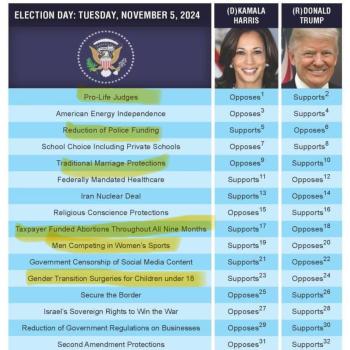This writing is a brief deviation from the weekly routine we’ve started. Usually, I would post an audio/video episode first. However, it’s July 4th, so I’m offering a writing on a topic that may or may not be forgotten in America, a big picture snapshot of character and community development.
Righteousness exalts a nation,
but sin is a disgrace to any people. (Proverbs 14.34, NASB)
i. Righteousness exalts a nation
Righteousness means to do good. It means to maintain right-standing with God. So when a people or nation (i.e. America) is in right standing with God, that people is exalted or lifted up.
The Hebrew word for righteousness is also translated justice up to 15 times in the King James Version. That’s interesting. Righteousness is not only for the individual, it is meant to impact society. One way I help people understand this societal righteousness is with the simple axiom:
My righteousness is only self-righteous until I help others become righteous.
ii. Sin is a disgrace
Do we really need to explore this statement? Disgrace means reproach or shame. It not only refers to a people that have done something shameful, the root word means that this is a people who have been put to shame. In other words, they are now associated with shame.
Don’t we all know people who have become identified with what they do wrong? We all know certain people groups who have become depraved over time (look no further than the Third Reich that the rest of the world had to bind together to defeat).
But don’t we take on a mentality of shame as well, like one takes on a victim mentality, an addictions persona, a deviant lifestyle, etc.? We start to think, “This is who I am, so I’ll just do what I’m known for.”
Sin is a disgrace, not only to individuals, but to the American people. For example:
FAKE NEWS!!
Everyone knows what it is and everyone says it’s bad, bad, bad . . . but we’re still gorging ourselves on it. We’re feeding on disgrace!
Sin defaces character, but righteousness builds it.
iii. Christians used to know what it meant to engage society
Christians used to be respected in the marketplace, not just for our values, but for the quality of our work. Do employers still look for churchgoers at all, because they know there will be a markedly different commitment level?
How many Christians still aspire to become experts in our chosen fields, with the conviction that all good work is God’s work? Do we live for the glory of God in our vocations? Are the days gone when we used to be a witness, even without words, by the quality of our work and the light of our character?
Character most often precedes witness.
We also used to live in times when it was okay to let our voice be heard. We weren’t afraid. We were respected. There was a time when the church was central to society, a key voice.
Tony Jones asserts that people are still seeking for something real. They’re looking for something spiritual . . . just not in church. We’re living in the most spiritual time in American history, but Christianity is no longer seen as the answer.[1]
We used to be able to bind together and affect change. I’m not so sure the church is the key player we used to be.
iv. If they’re turning a deaf ear to Christianity, what will they listen to?
If we can’t talk about Christianity anymore, what can we talk about? What can we share with our family and friends?
Christianity may not be a hot topic but character still is. People respect virtuous character, so we have an opportunity before us. Our Godly character can still impact our families, city, and nation. That seems to be the point of Proverbs 14.34.
What is Character?
I find no better definition in academic works than I find in youth leadership and character training material. Impact Leadership Development defines character as:
“1) Someone’s reputation, attitude, qualities, traits, disposition, manners, view, stand, & ultimately lifestyle. 2) The image that you display to others. 3) Doing the right thing when nobody is around to see. 4) Doing the right thing when the wrong thing is being done to you. 5) What other people have come to expect of us because of our lifestyle. 6) Moral and ethical strength. 7) Being honest, trustworthy, person of your word, transparent, punctual, loving, having empathy, being graceful, etc. 8) Godly Character, bottom line is being Christ-like.”[2]
Christ-like character traits still catch the eye of those around us. They are often a silent witness, but are these characteristics celebrated anymore? Are they still part of the bedrock of America?
v. Do you remember a time when communities were different in America?
Do you remember a time when your success was my success? That’s exactly the time Clifton Taulbert helps us remember, an era of intentional unselfishness.
Clifton Taulbert is a Christian, an author, a Pulitzer Prize nominee, and a sought after teacher and consultant. He begins looking at character development, not with the individual, but with community.
We often focus on nurturing and helping individuals mature. Even our Christian self-help books on the disciplines, spiritual practices, and exercises seem a little self-centered. “To change the world, I have to change me.”
Clifton starts with communities that develop character. Develop communities first, so communities can nurture growth in individuals.
“In the community, a nurturing attitude is characterized by unselfish caring, supportiveness, and a willingness to share time . . . Many of us remember a time when our lives and the success of our lives were the concerns of a great number of people, not just our primary families.”[3]
It’s those type of communities where values and character grew deep. Some of us remember a time when we knew, not just our neighbors, but just about everyone in our neighborhood. We remember a high level of trust and a common commitment to nurturing.
If we don’t remember that in our neighborhoods, then do we recall a different time in our extended families? Were there times when we were not so distracted, when family time was a celebration, when uncles and aunts instilled values in us like our own parents, etc.?
Do we remember this type of community cooperation in the synergy of high school athletic teams, or civic groups and community clubs?
 Cherry Festival: Consumers Energy Heritage Parade, Traverse City, MI, 06.03.18
Cherry Festival: Consumers Energy Heritage Parade, Traverse City, MI, 06.03.18
vi. Questions for Christian character development
1. The big question is do we “remember a time when our lives and the success of our lives were the concerns of a great number of people” in our congregations? Is that still the case?
2. Do Christians still have the necessary tools to care for and nurture others, even though the golden years seem to be gone?
3. Do we have a sense of true discipleship (or catechesis) in our congregations, or is it a secondary pursuit? A preacher recently said that the church in America is now reaping the consequences of our lack of discipleship.
4. If we have discipleship, is it individually focused, or communally based?
5. What skills/tools do we have to impact society through community character development, that may be lying dormant?
We don’t have to pine away for yesterday. The same Word that built the Primitive Church is available today. We have the same leader, the Spirit of God, that led the Apostles. He is active today. The same virtues of character in the Early Church community can be developed in the 21st century church . . . right here and now . . . in America.
Righteousness exalts a nation,
but sin is a disgrace to any people. (Proverbs 14.34)
[1] Tony Jones, Postmodern Youth Ministry: Exploring Cultural Shift, Creating Holistic Connections, Cultivating Authentic Community (El Cajon, CA: Youth Specialties, 2001), 57. [2] Adapted from: ILD, “Character Development: Session 1,” in ILD Impact Leadership Development: Zone 1 (Joplin, MO: Impact PCG Student Ministries, 2008-2009), 2-7. [3] Clifton L. Taulbert, Eight Habits of the Heart: Embracing Values that Build Strong Families and Communities (New York, NY: Penguin, 1997), 11-13.












